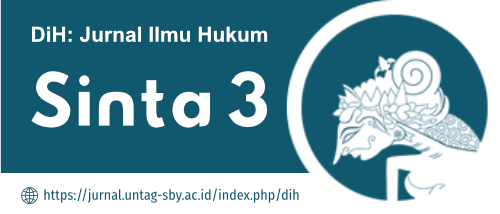KARAKTERISTIK KEDUDUKAN HUKUM AHLI WARIS KHUNTSA BERDASARKAN ADAT BADAMAI MASYARAKAT BANJAR
DOI:
https://doi.org/10.30996/dih.v11i22.2234Keywords:
Distribution of Inheritance, Heirs Khuntsa, Indigenous BadamaiAbstract
Badamai at Banjar Adat community is the implementation of Islamic moral value that have always taught the way of peace or islah in resolving a dispute. Badamai in inheritance disputes prevalent in Banjar society islah way. Similarly in the case of dispute resolution such as divorce marital reconciliation, separate beds (barambangan), including the division of joint property badamai finish (treasure continence) during the marriage in the event of divorce or because of divorce life, this is often done by attempting to reconcile through roles (hakamain). The results of this research are: (1) the division of the community estate in Banjar performed usig an agency called islah, which is essentially the institution determines each part of the theirs and other beneficiaries by consensus. In the role of institutions islah master teacher and close relatives are parents is crucial. Therefore there is the role of master teacher, then the provisions of Islamic aw into their benchmark. But under normal circumstances (no inheritance dispute) the division of inheritance is done varies, at least in two ways, Fara’id-Islah ad second Islah way, and (2) how to completion of the distribution of the estate is done in a family that is by agreement of the heirs based on a custom badamai valid for the Banjar, a wise solution to address the differences in economic conditions heirs. Waris Distribution Agreement in principle heir to the principle of division of real kinship is based on the belief of the scholars of fiqh that matter the beneficiary is an individual right which shall have the right to use or not use its right, or use their rights in a particular way while not harming others in accordance with the standard rules apply in ordinary circumstancesDownloads
Download data is not yet available.
References
Keputusan Menteri Agama Nomor 154 Tahun 1991.
Downloads
Published
2015-02-01
Issue
Section
Articles
License
Authors who publish with DiH: Jurnal Ilmu Hukum agree to the following terms:
- Authors transfer the copyright and grant the journal right of first publication with the work simultaneously licensed under a CC BY-SA 4.0 that allows others to share the work with an acknowledgement of the work's authorship and initial publication in this journal.
- Authors are able to enter into separate, additional contractual arrangements for the non-exclusive distribution of the journal's published version of the work (e.g., post it to an institutional repository or publish it in a book), with an acknowledgement of its initial publication in this journal.
- Authors are permitted and encouraged to post their work online (e.g., in institutional repositories or on their website) prior to and during the submission process, as it can lead to productive exchanges, as well as earlier and greater citation of published work (See The Effect of Open Access)










